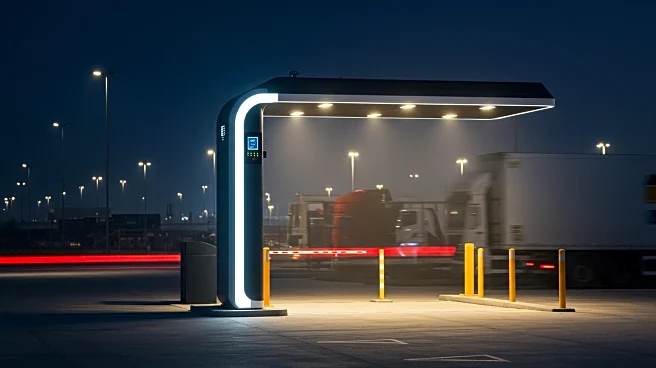What is the story about?
What's Happening?
Outpost, a national network of truck terminals based in Austin, Texas, has introduced a new gate automation platform aimed at reducing significant avoidable costs associated with terminal operations. The platform targets supply chain stakeholders such as shippers, enterprise fleets, and terminal operators, addressing costs related to labor, security, and bottlenecks, which are estimated to be around $6.7 billion annually. Utilizing computer vision and AI, the platform promises to cut gate operating costs by 70%, enhance yard security, and eliminate entry and exit delays. It automatically captures 99.9% of gate events with accurate, auditable data. Outpost's Chief Technology Officer, Greg Akselrod, emphasized the necessity of this platform due to outdated manual gate processes that increase costs and security risks. The platform has been tested across more than one million real-world gate events at Outpost's terminals before its market release.
Why It's Important?
The introduction of Outpost's gate automation platform is significant for the logistics and transportation industry, as it addresses common bottlenecks at terminal gates, which are critical points in the supply chain. By automating these processes, the platform offers faster, more accurate operations available 24/7, leading to higher throughput and better visibility. This innovation is poised to reduce operational costs significantly, freeing up budget for higher-value work. Improved security measures, such as detecting tailgating and fraudulent IDs, enhance the safety and reliability of terminal operations. The platform's ability to adapt to various facilities, including truck terminals and distribution centers, makes it a versatile solution for the industry.
What's Next?
Outpost plans to expand its service footprint across critical freight corridors, having recently acquired new properties in Dallas, Southern California's Inland Empire, Las Vegas, and Savannah. These acquisitions mark Outpost's initial presence in Nevada and Georgia. The company aims to deploy the platform quickly, with most sites operational in under a week without heavy civil work. As the platform gains traction, it may influence other logistics companies to adopt similar technologies, potentially leading to widespread automation in terminal operations.
Beyond the Headlines
The deployment of Outpost's gate automation platform could have broader implications for the logistics industry, including ethical considerations around job displacement due to automation. As manual processes are replaced by AI-driven solutions, there may be a shift in workforce dynamics, requiring new skills and training for employees. Additionally, the platform's ability to operate in various weather and lighting conditions highlights the technological advancements in AI and computer vision, setting a precedent for future innovations in logistics and supply chain management.


















